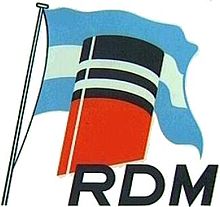Rijn-Schelde-Verolme
 |
|
| Industry | Shipbuilding |
|---|---|
| Founded | 1902 |
| Defunct | 1996 |
| Headquarters | Rotterdam, the Netherlands |
| Products | Civilian ships and warships |
The Rotterdamsche Droogdok Maatschappij (RDM), was the largest pre-World War II shipbuilding and repair company in Rotterdam in the Netherlands, existing from 1902 to 1996. It built 355 mostly major seagoing vessels, 18 of which were submarines. During its existence, the wharf operated 12 floating docks and in its heyday employed 7.000 people at one time.
RDM was established on 23 January 1902 in the Heijplaat district, located on the banks of the river Meuse (locally named 'Maas'). It was a movement of a company founded in Delfshaven in 1856 by Duncan Christie.
On 14 January 1925, a shipbuilding facility was set up as a subsidiary on the northern bank in Schiedam and continued to function as a separate establishment until 1978.
In 1928/29 the so-called 'Onderzeebootloods' (submarine hall) was built. This was enlarged three times. Here, 17 Dutch and 1 Polish submarine were constructed. Two of the subs fell into German hands in May 1940, and duly served in the Kriegsmarine, the navy of Nazi Germany. The Germans also found the snorkel here, a Dutch invention. This apparatus allows subs to use their diesel engines under water, greatly extending their range, and subsequently all German U-Boats were equipped with this. The hall is now part of the so-called RDM Campus, a combination of research and development companies and a college.
In 1938, the RDM bought, with Wilton-Fijenoord, all shares of P. Smit Jr. Shipbuilding and Machine Factory of D.G. van Beuningen. This company remained under its own name during its existence.
During World War II, the company fell into German hands undamaged and intact, regardless of having been a major arms supplier to the Royal Dutch Navy. The management decided to continue business as usual, although the representative of Queen Wilhelmina (who herself had fled to the United Kingdom), General Henri Winkelman, expressly forbade any work on German military projects. Work on Dutch military products could be continued.
...
Wikipedia
